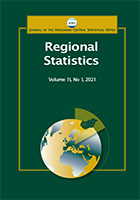Interlinkages between human development, residential energy consumption, and energy efficiency for the EU-27 Member States, 2010–2018
Interlinkages between human development, residential energy consumption, and energy efficiency for the EU-27 Member States, 2010–2018
Author(s): Mohammad KashourSubject(s): Social Sciences, Economy, Geography, Regional studies
Published by: Központi Statisztikai Hivatal
Keywords: human development; energy consumption; life expectancy; education; gross national income (GNI); energy efficiency
Summary/Abstract: This study aims to highlight the importance of human development in light of residential energy consumption and its relationship with energy efficiency. It investigates the influence of the human development indicator (HDI) on residential energy consumption inequality for the EU-27 Member States for the period of 2010–2018 by using the Gini coefficient. It also analyses the effect of the HDI components life expectancy, education, and gross national income (GNI) on residential energy use with the help of the least squares dummy variable (LSDV) model. The novel results indicate that territorial inequality in energy use would drop if all member states had the same HDI value. The LSDV model results show that life expectancy negatively influences energy consumption, the education index has no effect, and GNI shows a positive relationship. In addition, energy efficiency is found to exert a significant influence on human development on the basis of the energy efficiency scores for all member states. The results divide the member states into high, low, and average groups according to their energy efficiency scores and HDI values. Through this classification, this study provides policy recommendations for each group.
Journal: Regional Statistics
- Issue Year: 13/2023
- Issue No: 01
- Page Range: 36-54
- Page Count: 19
- Language: English

